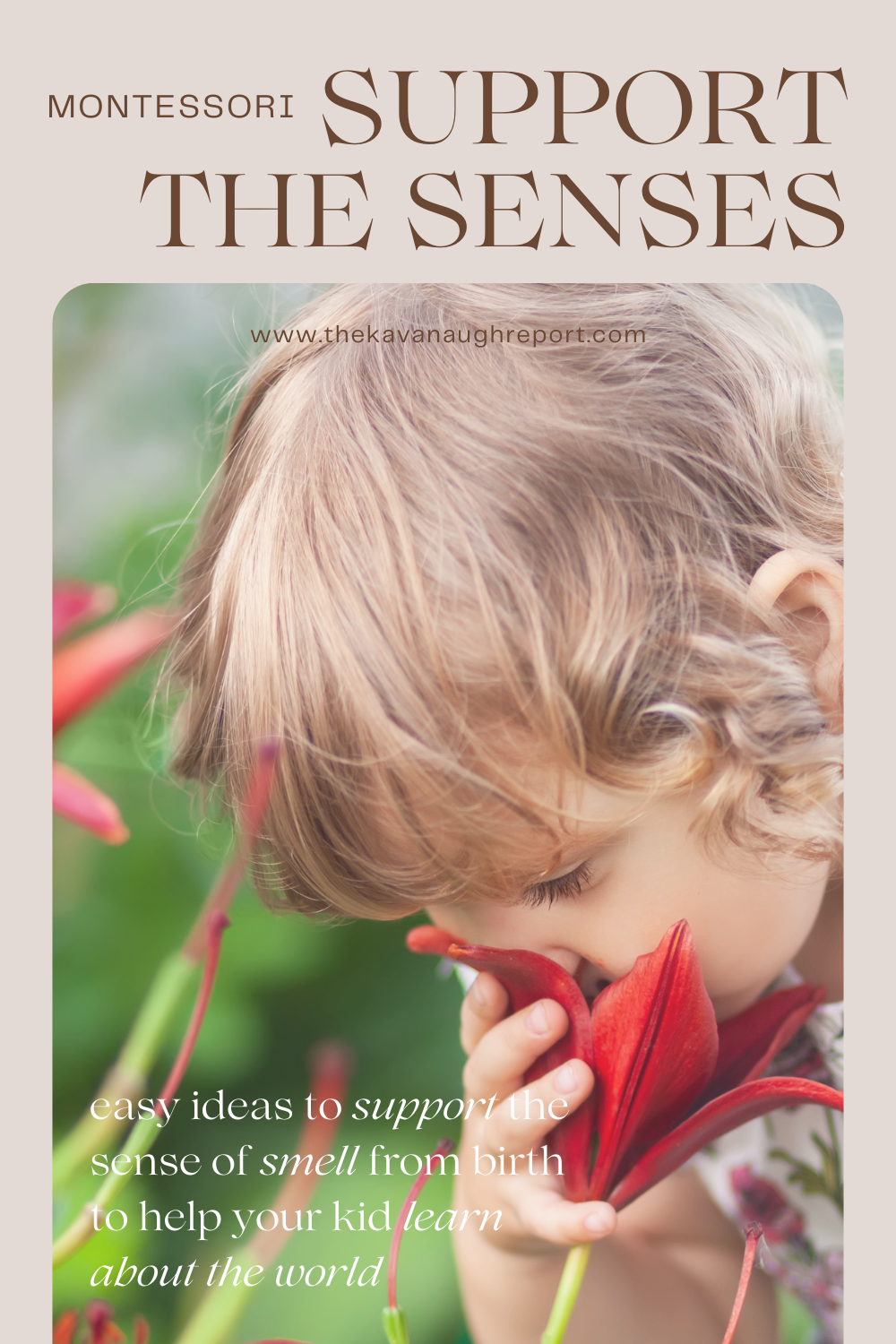We know through both Maria Montessori's writings and observations and through modern science that children learn best through their senses. As their bodies experience the world with their senses, their body gives important feedback to their brains. This feedback helps to create connections in the brain that are the foundation for all future learning. It is through and by sensory feedback that children come to understand the world that we live in. As Montessori parents, we can help our children learn and grow by supporting their developing sensory systems in our homes.
We don't often think of the sense of smell as being essential to the learning process. But, just like any other sense, we can help to support it's development through Montessori activities and with our parenting.
"The training and sharpening of the senses has the obvious advantage of enlarging the field of perception and of offering an over more solid foundation for intellectual growth. The intellect builds up its store of practical ideas through contact with, and exploration of its environment." Maria Montessori, Discovery of the Child
The Sense of Smell and Montessori Homes
We don't have to plan a lot of complicated activities in order to support our children's sensory development. The senses are all around us and we really can make some small adjustments in our activity and language to call attention to the learning that is already taking place. Here are some ideas for supporting the development of the sense of smell in your Montessori home.
"Put simply, the senses are the very beginning of learning. They deliver the raw information the brain needs to make sense of the world." A Moving Child is a Learning Child
Babies and Young Toddlers and the Sense of Smell
Babies are born with their sense of smell. Their mother's scent is familiar and the sense of smell can be used to help them find the breast in their early nursing experiences. It's truly incredible. Here are some ways to support a baby and young toddler's developing sense of smell:
Use a Topponcino: For the early days this helps to keep strong scents of others (well meaning family and friends who come to hold the baby) from getting on the baby. The topponcino also smells like the mom (or caregiver that has slept with it) which can be comforting when the baby has to be physically separated from a parent.
Be Aware of the Smells You Use: Especially for tiny babies, new scents that might overwhelm a baby and change that point of reference for your child. Your familiar scent will be comforting to your baby. Consider asking relatives to skip perfumes if they visit.
Cook/Eat Near Your Baby: So many smells are linked to the food we enjoy in our unique cultures. Don't shy away from exposing your baby or young toddler to those smells. Cook and eat near them so that they can enjoy that sensation.
Bring in Natural Elements: another great way to bring your specific culture and natural environment to your child. Fill your home with fragrant local natural elements. Place a flower near your baby, or teach your toddler how to safely smell a flower/plant.
Sense of Smell and Older Toddlers
As toddlers get older we can start to create some specific learning opportunities around smelling. We can move from simply exposure to giving language around the smells in our environments.
Smelling Jars: Place some interesting smells into a spice jar to allow a child to safely smell them. Citrus fruits, herbs, and plants work great. I also love this alternative of spices in muslin bags.
Talk about Smells: Point out smells along with other elements of things you are learning about. "This barn has a strong smell." "This flower smells sweet." Start to notice with your child that things smell differently and that we have different words to describe those scents.
Go on Smelling Walks: Go find smells in your world! They are all around. How does the earth smell? How does the garbage smell? How do the flowers? Or the tree? Practice noticing and naming.
Preschoolers and Sense of Smell
Preschoolers are often ready for more isolation and challenge when it comes to smell! And, Montessori environments are so cool that they make those opportunities available.
Matching Smelling Jars: this is a traditional Montessori work where children match small jars by scent alone. The jars should be the exact same and only the scents inside should change. A cotton ball with essential oils will work (very small amount) or an extract (peppermint or almond have been popular here) also work. Then kids can find the pairs that are the same.
Guess Tastes by Smell: Get some real food and try to guess how it will taste by smell alone. Will it be sweet? Sour? Salty? Use a blindfold to increase the challenge and see if your child can guess the name of the food by smell only or smell/taste!
There are so many amazing ways to support your child's sense of smell in a Montessori home. Giving your child the opportunity and language around smells is such a wonderful way to help them learn about the world we live in.
Read about how to support other senses in Montessori environments here: Hearing | Visual | Taste | Smell | Touch | Vestibular | Proprioception





